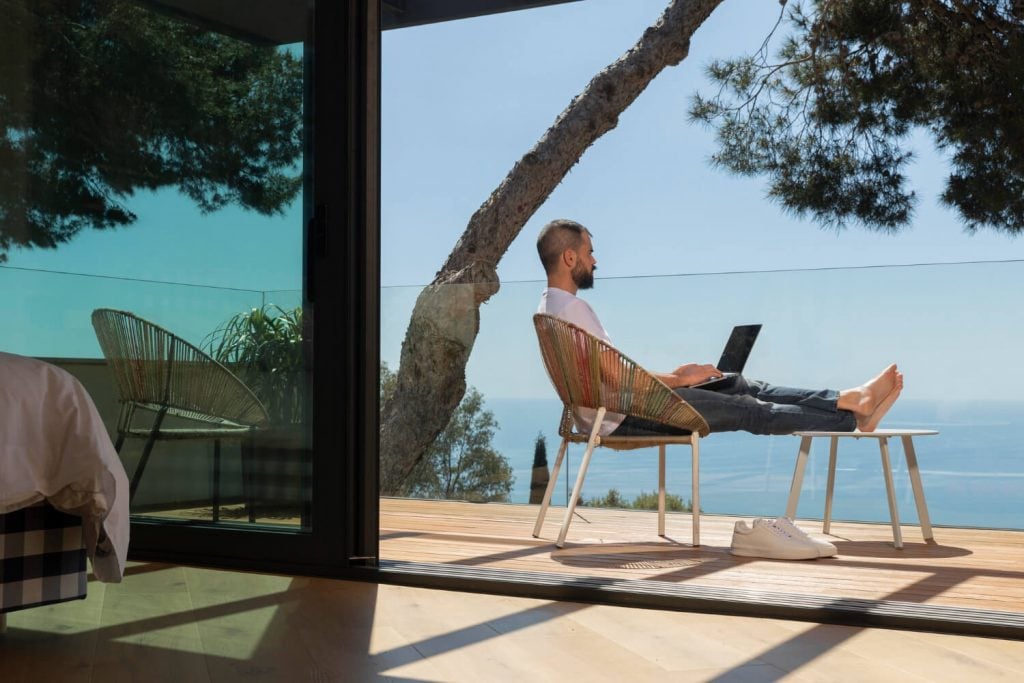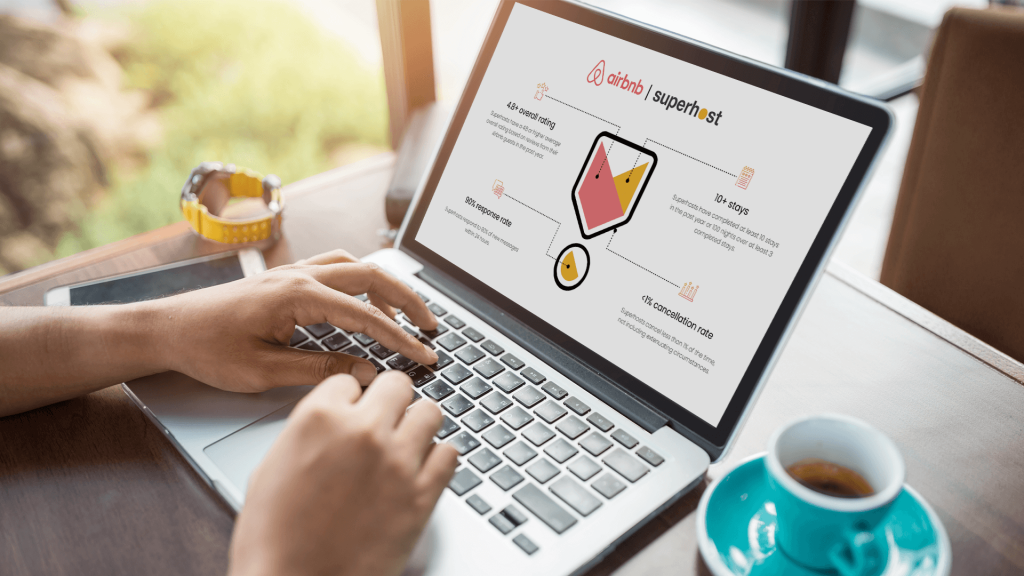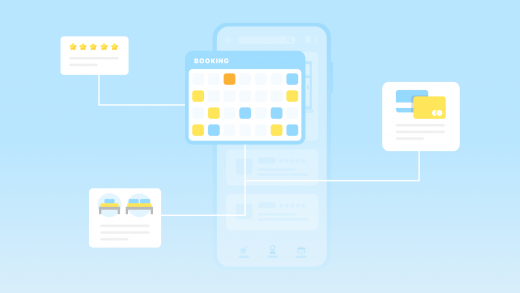Want to become an Airbnb property manager but not sure where to start? You’re not alone.
With the growth of short-term rentals, more and more people are turning property management into a flexible and profitable career. But what exactly does an Airbnb property manager do? How do you get clients, build trust, and stand out in a competitive market?
In this guide, we’ll walk you through the key responsibilities, the steps to become a professional Airbnb property manager, and practical tips to help you succeed. If you’re ready to turn your hospitality skills into income, keep reading.
Whether you’re a host or an Airbnb property manager, Hostex can save you over 70% of your daily repetitive tasks. Starting at just $4.90/month, it’s a must-have tool to streamline your short-term rental business.

What Does an Airbnb Property Manager Do?
While this can be a lucrative career path, it certainly comes with challenges. Like any job, the more effort you put in, the greater the reward. This is especially true when you are just getting started.
Before launching your Airbnb property management journey, it’s essential to understand what the role entails.
1. Distributing listings on OTA platforms
A skilled property manager understands the value of visibility. You should not only list on Airbnb, but also on Booking.com, Vrbo, and Expedia. This approach helps increase exposure and booking potential.
Additionally, having your own direct booking website also gives you full control over pricing, branding, and guest relationships.
2. Managing pricing and occupancy policies
Setting the right pricing strategy is key to maximizing occupancy and revenue. A professional manager studies competitors and market trends to stay competitive.
You will also need to adjust rates based on seasons, local events, and demand. At the same time, policies like minimum stays or last-minute discounts help attract more bookings.
3. Managing reservations and syncing calendars
Fast response to reservation requests builds guest confidence and avoids missed opportunities. Managing calendars across platforms helps prevent double bookings and ensures real-time availability.
4. Communicating with guests
Strong communication is the backbone of great hosting. You should answer inquiries quickly, offer helpful information, and be available throughout the guest’s stay.
Sharing local tips or offering early check-in options can enhance the guest experience and lead to better reviews.
5. Providing check-in and check-out services
Smooth check-ins and check-outs are essential. You must ensure the property is clean, stocked, and ready for each guest.
During the stay, handle guest needs promptly. After check-out, inspect the space and prepare it for the next booking.
6. Managing reviews and making improvements
Guest feedback provides valuable insights. You should monitor reviews and take action where needed.
Whether it’s replacing worn-out linens or improving communication, small improvements can lead to big gains in ratings.
7. Marketing and promotion
Visibility drives success. A good property manager uses SEO, social media, and sometimes paid ads to promote listings.
You may also collaborate with local partners or tourism sites to attract more travelers and grow brand recognition.
8. Arranging and managing cleaning and maintenance
Cleanliness is a top priority for guests. You will need reliable cleaners and a consistent schedule to ensure every turnover meets expectations.
You should also coordinate repairs and routine maintenance to keep the property in top condition.
9. Building relationships with property owners
For third-party managers, trust is essential. Keep owners informed about performance, income, and any property issues.
A transparent, proactive approach strengthens long-term partnerships.
10. Staying up to date with regulations and legal requirements
Short-term rental regulations vary by region. You must stay informed about permits, tax rules, and local laws.
Keeping everything compliant helps protect your business and avoids unnecessary risks.

How to Become an Airbnb Property Manager?
Becoming an Airbnb property manager takes planning and the right strategy. You need to find opportunities and prove yourself as a reliable co-host. Below are proven strategies to help you get started.
1. Seek Co-Hosting Opportunities
Opportunities rarely appear on their own—you need to go after them. At first, the search may seem overwhelming. But with focus and persistence, you’ll realize finding hosts isn’t as difficult as it looks.
① Use Online Platforms:
Start with Airbnb’s Local Partners page. Create a compelling profile to showcase your skills. This increases your visibility to hosts actively seeking co-hosts or managers.
② Join Online Communities:
Facebook groups and platforms like CoHostMarket can connect you with hosts. Share your insights and participate actively to position yourself as a trustworthy co-host.
③ Tap Into Your Network:
Ask friends, colleagues, or acquaintances if they know Airbnb hosts in need of help. Referrals from trusted sources can build instant credibility.
④ Reach Out to Local Hosts:
Use Airbnb’s platform to find local listings. Message hosts with a personalized offer to help manage their rentals. Be clear about your values and commitment.
⑤ Attend Local Events:
Go to Airbnb meetups or industry events in your area. These are great opportunities to meet hosts face-to-face and pitch your services.
⑥ Partner with Real Estate Agents:
Connect with local agents working in vacation rentals. They often know homeowners looking for property managers. Building relationships here can lead to consistent referrals.
2. Convince Airbnb Hosts to Hire You
Once you find interested hosts, the next step is to prove your value. Whether you have experience or not, you need to show why you’re the right fit.
If You Have Airbnb Management Experience:
Use your past experience as a strong selling point—but be specific.
- Highlight daily tasks you’ve handled, such as messaging guests or coordinating cleanings.
- Share success stories where you resolved issues quickly or helped guests have an outstanding stay.
- Mention positive guest reviews, Superhost status, or other accolades you’ve earned.
- Point out unique skills like language fluency or local knowledge that enhance the guest experience.
If You’re New to Airbnb Property Management:
Even without direct experience, you can win trust with the right approach.
- Show passion for hospitality and your eagerness to learn.
- Stay informed about short-term rental trends, laws, and tools to demonstrate professionalism.
- Explain your understanding of guest service, pricing, and problem-solving.
- Offer a competitive pricing model that balances affordability with value.
Whether you’re experienced or just starting out, what matters most is your mindset. Passion, reliability, and a service-first attitude will help you earn trust and grow your business.

How to Become an Excellent Airbnb Property Manager
Becoming an Airbnb property manager is just the beginning. To truly excel in this role, you need dedicated effort, a strong grasp of essential skills, and a commitment to professional growth.
If you genuinely aspire to be an outstanding Airbnb property manager, the following suggestions are likely to offer valuable insights and inspiration.
1. Property Preparation
When it comes to property preparation, attention to detail is key. An Airbnb property manager should focus on creating a memorable and enjoyable experience for guests, which leads to positive reviews and repeat bookings.
① Cleanliness
Ensure that your property is immaculately clean.:
- Pay close attention to every corner, including floors, carpets, bathrooms, and kitchen areas.
- Consider hiring professional cleaners to maintain a consistently high standard of cleanliness.
② Interior Design
Create a welcoming and visually appealing space:
- Invest in comfortable and durable furniture that matches the overall style of the property
- Select the right decor and furnishings that reflect a cohesive design
- Opt for a neutral color palette that appeals to a broad range of guests
③ Essential Amenities
Provide guests with essential amenities to enhance their stay, including:
- High-speed internet access
- Comfortable bedding and clean towels
- Toiletries and a fully equipped kitchen
- Coffee maker, iron and ironing board, and hairdryer
④ Attention to Details
Small details make a big difference. Be sure to:
- Add thoughtful touches like fresh flowers, a welcome basket, or a guidebook with local tips
- Check that all light bulbs are functioning properly
- Fix any leaky faucets or minor maintenance issues
- Test appliances to ensure everything works as intended
⑤ Safety Measures
Guest safety should always come first. Make sure to:
- Install indoor smoking detectors, carbon monoxide detectors, and fire extinguishers
- Inspect electrical outlets and cords for safety
- Provide clear instructions for any equipment or appliances that need special handling
2. Creating Outstanding Listings
Creating an outstanding listing is crucial for attracting potential guests. Here are some specific suggestions to help your listings stand out:
① Post High-Quality Images
Great photos can significantly improve your listing. Be sure to:
- Showcase every room, outdoor space, and any special design features
- Invest in professional or high-resolution photography
- Accurately represent the space and its key features
- Include wide-angle shots for the layout and close-ups for details
② Craft a Catchy Description
Clearly showcase the benefits your guests can enjoy during their stay.
- Use a memorable and descriptive listing name to spark guest interest
- Write a clear and persuasive description that sets your property apart from others in the area
- Be honest and accurate to set proper expectations and avoid guest disappointment
- List all key amenities and nearby attractions that enhance the stay experience
- Emphasize standout features such as a pool, hot tub, garden, scenic views, or a central location
③ Update and Refresh Your Listing
Regularly review and update your listing to maintain its appeal.
- Refresh your photos if you renovate or update the space.
- Add seasonal content to capture interest during specific times of the year or local events.
④ Optimize Your Listing with Smart Keyword Placement
Choosing the right words in your Airbnb listing can make all the difference.
Start by thinking like a guest. What would someone type into the search bar? Include terms related to your property’s location, style, and standout amenities.
- Use clear, specific phrases. Instead of “apartment,” say “modern loft near downtown” or “pet-friendly cabin with hot tub.”
- Place these keywords where they count most: in your title, the first lines of your description, photo captions, and amenity tags.
- Review top-performing listings in your area to see what keywords they use. Then tailor your own version to reflect your unique value.
- Test and refine your content regularly. Keep track of how different phrases affect visibility and bookings over time.

3. Optimizing Pricing and Booking Policies
Smart pricing and guest-friendly policies can significantly boost bookings. Here are practical strategies to help you stay competitive and increase occupancy:
① Research the local market
Study similar properties in your area to understand average rates. Consider factors like size, amenities, and location. This helps you set a competitive price that attracts guests without undervaluing your space.
② Adjust rates for seasonality and demand
Raise your prices during peak seasons, holidays, or local events. Offer lower rates on weekdays or during slower seasons to stay attractive when demand drops.
③ Offer discounts for longer stays
Weekly and monthly discounts appeal to guests looking for extended accommodations. This can help reduce gaps between bookings and attract remote workers or long-term travelers.
④ Use flexible booking policies
Allow free cancellations within 48 to 72 hours before check-in to reduce booking hesitation. Clearly communicate your cancellation terms to avoid confusion.
⑤ Create timely promotions
Run targeted offers during off-peak periods or around specific events. Consider discounts for last-minute bookings, returning guests, or holiday travelers. Promote your deals through your listing and social channels.
⑥ Monitor and update your pricing
Keep an eye on your performance metrics, local demand, and competitor pricing. Make adjustments as needed to stay competitive. Consider using dynamic pricing tools to automate rate changes based on real-time data.
4. Effective Communication with Guests
Strong communication is essential for guest satisfaction and positive reviews. Here are proven ways to improve how you connect with your guests:
① Respond to inquiries promptly
Aim to reply within a few hours. Quick responses show you are attentive and reliable. You can also use auto-reply tools to acknowledge messages when you are temporarily unavailable.
② Share clear and complete information
Make sure your listing and guest messages explain everything about your property, amenities, and house rules. Use accurate descriptions and visuals, and address common questions in advance to reduce back-and-forth communication.
③ Handle concerns with empathy
If a guest reports an issue, respond quickly and take their concerns seriously. Offer solutions, follow up after resolution, and show you are committed to their comfort.
④ Offer multiple ways to connect
Let guests choose their preferred method of communication. Include your online chat, email, or phone call. Stay responsive across all channels.
⑤ Explain check-in and check-out clearly
Send detailed instructions in advance. Let guests know how to access the property and what they should do at departure. This helps avoid confusion and makes their stay smoother.

5. Providing Exceptional Guest Experiences
Delivering outstanding guest experiences is key to earning five-star reviews, building your reputation, and securing repeat bookings. Here are several practical ways to impress your guests:
① Keep everything in top condition
Regularly inspect your property to ensure cleanliness, comfort, and full functionality. Small details such as crisp linens, quality toiletries, and a well-stocked kitchen make a lasting impression.
② Offer thoughtful extras
Add a welcome package with local snacks, a handwritten note, or a curated guidebook with local recommendations. If possible, provide concierge-style help with bookings, transportation, or special requests.
③ Personalize the experience
Acknowledge special occasions and guest preferences when possible. A bottle of wine, a custom welcome note, or tailored tips for nearby activities can help guests feel truly cared for.
④ Stay available and responsive
Make it easy for guests to reach you and reply quickly to questions or issues. Being present and helpful during their stay is one of the simplest ways to win their trust.
6. Managing Reviews and Continuous Improvement
Effectively managing reviews and making ongoing improvements helps maintain your reputation, build trust, and drive more bookings. Here are specific ways to approach this:
① Respond to all reviews promptly
Thank guests for positive feedback and acknowledge any concerns they mention. Timely responses show that you care and are attentive to guest experiences.
② Handle negative feedback with professionalism
Stay calm, apologize for the inconvenience, and offer a clear explanation or solution. If needed, invite the guest to continue the conversation privately. This builds credibility and reassures future guests.
③ Showcase positive reviews across your channels
Feature glowing testimonials on your listing, website, and social media. This boosts confidence in your property and highlights the quality of your service.
④ Use feedback to identify improvement areas
Look for recurring comments about things like cleanliness, communication, or amenities. Take these insights seriously and use them to refine the guest experience.
⑤ Implement improvements based on reviews
Keep your property in top condition and ensure that your listing reflects its current state. Invest in upgrades when necessary, and adapt to meet evolving guest expectations.
⑥ Ask for feedback during the stay
Invite guests to share their thoughts through surveys, emails, or informal check-ins. By gathering feedback early, you can resolve issues before they affect reviews. Small incentives may help encourage responses.

7. Marketing and Promotion
Effective marketing helps increase visibility and attract more bookings. Consider the following approaches to promote your Airbnb property successfully:
① Use social media to showcase your listing
Post high-quality photos and videos on platforms like Instagram or Facebook. Engage with comments, answer messages promptly, and use location-relevant hashtags to reach more viewers.
② Invest in online ads
Platforms like Google Ads and Facebook Ads allow you to target specific audiences. Create appealing visuals and compelling copy to promote your property and track performance to improve results.
③ Create engaging content
Write blog posts or travel tips related to your location. Share this content on your website, social media, or email newsletters to improve SEO and build credibility with potential guests.
④ Partner with influencers
Invite travel bloggers or content creators for a stay in exchange for posts, reviews, or videos. Their endorsements can expand your exposure to a relevant and interested audience.
⑤ Run special offers
Use discounts or limited-time deals to drive bookings during low seasons or attract first-time guests. Share your offers through all marketing channels to boost visibility and urgency.
⑥ Collect and highlight guest reviews
Encourage satisfied guests to leave feedback. Display positive testimonials in your listing and on your social media. Respond to all reviews to show your professionalism and care.
⑦ Collaborate with local businesses
Build partnerships with nearby restaurants, activity providers, or transport services. Offer cross-promotions or guest perks to support each other and create added value.
8. Efficient Cleaning Management
Maintaining high cleanliness standards is essential for guest satisfaction and long-term success. Here are practical steps to streamline your cleaning process:
① Create Detailed Checklists
Develop comprehensive checklists for each area of your property, including bedrooms, bathrooms, common areas, and outdoor spaces. Include essentials like dusting, vacuuming, disinfecting, and restocking supplies. This helps ensure consistency and accountability.
② Schedule Regular Cleaning
Set a regular cleaning schedule based on guest turnover and space usage. High-traffic areas may need daily attention, while less-used zones can be cleaned weekly. Regular deep cleaning should also be planned.
③ Train and Supervise Cleaning Staff
Provide clear guidance on cleaning protocols, equipment use, and hygiene standards. Offer hands-on training and conduct spot checks to ensure consistency. Address any performance issues promptly.
④ Utilize Technology and Tools
Leverage tools like cleaning apps or vacation rental software with housekeeping features. These tools help assign tasks, track progress, and communicate with cleaners in real time. Also, invest in quality cleaning gear to improve effectiveness.
⑤ Implement Quality Control Measures
Regularly inspect cleaned areas to catch missed spots and uphold standards. Give constructive feedback to your team and offer refresher training when needed. A second pair of eyes can make all the difference.

9. Handling Emergencies and Unexpected Situations:
Being prepared for emergencies is essential to protect your guests, staff, and property. A proactive approach can make a significant difference when unexpected situations arise.
① Create an Emergency Plan
Outline clear steps for handling fire, natural disasters, power outages, or medical emergencies. Include emergency contacts for local authorities, hospitals, and utility services. Make sure the plan is accessible to both guests and staff.
② Provide Clear Instructions
Share safety information with guests upon check-in. Include evacuation routes, emergency contacts, and safety guidelines in the welcome book or display them in a visible location inside the property.
③ Train Your Staff Regularly
Make sure team members know how to respond to different emergencies, use safety equipment, and fulfill their roles under pressure. Conduct refresher training sessions regularly to maintain readiness.
④ Maintain Safety Equipment
Schedule routine checks of fire extinguishers, smoke alarms, emergency lighting, and first-aid kits. Document each inspection and repair to stay compliant and ensure full functionality.
⑤ Establish Communication Channels
Give guests multiple ways to reach you in emergencies, such as phone, SMS, or a dedicated 24/7 line. Respond promptly to minimize stress and uncertainty.
⑥ Build Relationships with Local Authorities
Stay in touch with police, fire departments, and nearby emergency responders. Knowing whom to call and how they operate can help you secure faster assistance when needed.
⑦ Review and Improve the Emergency Plan
Update your protocols regularly to reflect local regulations or lessons learned. Simulate emergency drills when possible and gather feedback from staff and guests to make improvements.
10. Harnessing the Power of Vacation Rental Software:
Automating daily tasks is key to scaling your Airbnb operations. A platform like Hostex helps professional Airbnb property managers save time, stay organized, and improve guest satisfaction.
- Real-time channel calendar sync. Hostex integrates with Airbnb, Vrbo, Booking.com, and Expedia, keeping your availability and pricing consistent across platforms. This eliminates double bookings and reduces manual updates.
- Automated guest communication. Hostex uses artificial intelligence to recognize common guest inquiries and send automatic responses. It also sends scheduled messages with check-in info, house rules, and check-out reminders.
- Automated task assignment. After each booking, Hostex automatically generates cleaning tasks and notifies the assigned team. This ensures no turnover is missed and cleaning is completed on time.
- Dynamic pricing optimization. Hostex offers rule-based pricing tools to help you adjust nightly rates based on seasonality, demand, or competitor rates. It updates prices in real time across all booking platforms.
- Streamlined review management. Hostex sends automated review requests after each stay. You can also set it to reply to guest reviews with prewritten templates, saving you time while maintaining your online reputation.
- Smart lock integration. Hostex generates unique access codes for each booking and sends them directly to guests, enabling hassle-free self-check-in. No physical key handoff required.
- Custom booking site builder. Create your own direct booking website in minutes using Hostex’s drag-and-drop builder. This lets you collect direct reservations without paying OTA commissions.
With pricing starting at just $4.90 per month, Hostex delivers powerful automation at a budget-friendly rate, perfect for growing your vacation rental business efficiently.

FAQs about being an Airbnb property manager
1. What qualifications are required to become an Airbnb property manager?
Becoming an Airbnb property manager does not require specific qualification requirements. However, having industry experience and knowledge will greatly contribute to your success in this role. Prior experience in property management, hospitality, or customer service can provide a strong foundation for understanding the needs of guests and effectively managing properties.
2. Do you need a real estate license or certification to manage Airbnb properties?
The need for a real estate license or certification to manage Airbnb properties varies depending on the local regulations and laws of the specific location where the property is situated. Some jurisdictions may require property managers to hold a valid real estate license, while others may not have such requirements. It is essential to research and comply with the local laws and regulations governing property management in your area.
3. How much money can Airbnb property managers earn?
The potential earnings for Airbnb property managers can vary significantly based on factors such as the location of the property, the number of properties managed, the demand for short-term rentals in the area, and the level of services provided. Successful property managers can generate a substantial income stream, but it is important to consider the costs associated with property maintenance, marketing, and guest services when estimating potential earnings.
4. What legal regulations and laws do Airbnb property managers need to be aware of?
Airbnb property managers must be familiar with the legal regulations and laws that govern short-term rentals in their specific locations. This may include zoning regulations, tax requirements, safety codes, and permits or licenses necessary for hosting guests. Staying updated on any changes in local legislation and complying with all legal obligations are essential to avoid penalties and ensure a smooth operation.
5. What avenues are available for Airbnb property managers to access support and resources?
Airbnb provides a range of resources and support for property managers through its online platform. They offer tools and features to manage bookings, communicate with guests, and handle payments. Additionally, Airbnb offers educational materials, webinars, and forums where property managers can learn from industry experts and connect with peers. Utilizing professional networks, attending industry conferences, and joining local associations can also provide valuable support and access to resources for Airbnb property managers.

Final Thought
Becoming an Airbnb property manager can be a great choice for those interested in the vacation rental industry, seeking a profitable career, and desiring the flexibility to work on their own terms. To succeed in this role, it is important to acquire relevant knowledge, seek opportunities, plan strategically, and implement effective management skills.
Additionally, leveraging automation through advanced short-term rental management software like Hostex can significantly enhance your efficiency and business expansion. With its comprehensive features, Hostex empowers you to streamline operations and provide exceptional guest experiences.
In summary, becoming an Airbnb property manager offers exciting prospects in the vacation rental industry. By equipping yourself with the necessary skills and utilizing advanced software like Hostex, you can thrive in this dynamic field and embark on a fulfilling professional journey.




Informative and inspiring, nice job!
Valuable insights
Comprehensive guide, covering all the essential steps to becoming a successful Airbnb property manager.
Kudos to the author for sharing such practical tips.
I highly recommend this article to anyone who wants to excel in the world of Airbnb property management. It’s a comprehensive guide that covers all the essentials.
Practical tips for Airbnb property managers, loved it!
Clear and concise guide, perfect for beginners!
Well done!
I highly recommend this article to anyone who wants to excel in the world of Airbnb property management. It’s a comprehensive guide that covers all the essentials.
I found the step-by-step approach outlined in this article extremely helpful. It provides a clear roadmap for aspiring Airbnb property managers.
a must-read for aspiring managers
Informative and inspiring, great job!
Awesome read!
Inspiring as always!